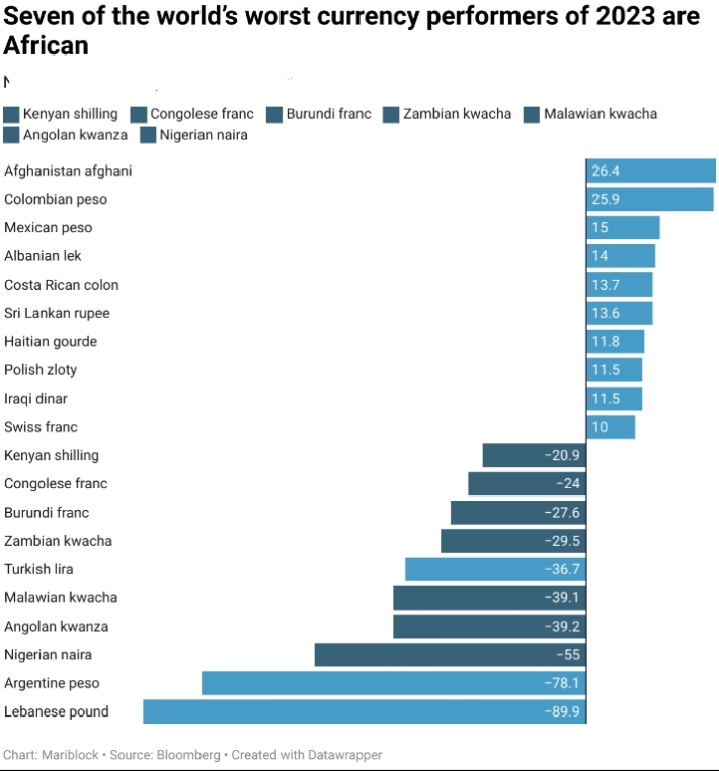By Joan Chioma Obinagwam
Since the year 2022, Nigeria has experienced drastic depreciation in its currency; largely due to increased demand for foreign exchange amid haemorrhaging external reserves, high fiscal deficits, excessive public borrowing, low oil production, among others.
In fact, in 2023, Nigeria’s currency— the naira, was the worst performing currency among other African currencies according to data from Bloomberg.

The naira shaved a whopping N930.841 or 126.645 per cent from the ₦735 to a US dollar that it closed the year at the official window in 2022 down to ₦1665.841 on the 7th of November, 2024.
The situation which has continued unabated, has had adverse effects on the populace and businesses.
One of the many companies that were badly hit is Nestlé Nigeria PLC; Nigerian Breweries, Cadbury Nigeria, and Guinness Nigeria, to mention only a few, have recorded significant losses due to the naira depreciation.
Data mined from the company’s full year financial report for the period ended 2023, showed that despite a significant increase in revenue of N100 billion or 22.4 per cent in the year under review, the gains were eroded by a After-tax loss of N79.4 billion.
The Chairman of the company, Gbenga Oyebode attributed the loss to the devaluation of the naira.
He said, “ Our profit after tax of -N79.4 billion was negatively impacted by the revaluation of our foreign currency obligations due to the devaluation of the Naira. The resultant negative equity position is being reviewed by the Board, as we proactively monitor the developments in monetary policy.
To navigate these challenges and ensure sustained profitability, Nestlé Nigeria can employ hedging strategies to mitigate currency risks.
Demystifying Hedging
According to Investopedia, a leading financial media website, Hedging is a risk management strategy employed to offset losses in investments by taking an opposite position in a related asset.
In lay man’s terms, it is like buying insurance to protect yourself from potential losses. It involves taking an action to reduce the risk of an investment.
Using a hypothetical situation, imagine Mr. A owns a small bakery. You buy flour every month to make bread, and the price of flour can go up or down. If the price goes up, your costs increase, and you make less profit. To protect yourself from this risk, you decide to hedge.
Now, hedging employs some derivatives tools. For instance, by “Buying a Futures Contract”. In this scenario, you agree with a supplier to buy flour at a fixed price for the next six months. Even if the market price of flour goes up, you still pay the agreed price, protecting your bakery from higher costs.
The second example is by “Using Options” Suppose you own shares in a company, and you’re worried the stock price might drop. You can buy a “put option”, which gives you the right to sell your shares at a specific price. If the stock price falls below this price, you can still sell your shares at the higher, agreed-upon price, minimising your loss.
Why hedging is crucial for Nestlé Nigeria
Currency risk, also known as exchange rate risk, arises from the change in price of one currency against another. For Nestlé Nigeria, which imports raw materials and exports finished products, fluctuations in the Naira’s value can significantly impact costs and revenues. By employing hedging strategies, Nestlé Nigeria can stabilise its cash flows and protect its profit margins.
Reacting to the importance of Hedging in business, stockbroker and vice chairman of Highcap Securities Limited, David Adonri said: “Hedging against currency-related risks remains the most potent means to insulate a company from losses that may arise as a result of currency devaluation.”
Hedging Strategies for Nestlé Nigeria
Operational hedging
It involves managing risks through business operations rather than financial instruments. This can include strategies like diversifying suppliers, expanding into different markets, or adjusting production processes to mitigate risks related to supply chain disruptions, currency fluctuations, or other operational challenges.
Natural hedging
It refers to the practice of reducing risk by matching cash flows in foreign currencies. For example, if Nestlé earns revenue in a foreign currency it might also incur expenses in that same currency, thereby naturally offsetting the risk of currency fluctuations without the need for financial instruments.
More so, Nestlé might use natural hedging by sourcing raw materials locally in each country where it operates. If Nestlé sells products in Nigeria and earns revenue in Naira, it can source ingredients from Nigerian suppliers, thus matching its costs with its revenues in the same currency.
In essence, natural hedging is a specific type of operational hedging focused on aligning revenues and expenses to mitigate currency risk. Both strategies aim to reduce risk, but natural hedging is more narrowly focused on currency risk management.
Hybrid hedging
Hybrid approaches to currency risk management combine elements of both natural and financial hedging to create a more comprehensive strategy. This allows companies to leverage the strengths of each method while mitigating their respective limitations.
Financial hedging
It involves using financial instruments such as options, futures, etcetera, to offset potential losses in investments.
Forward Contracts
Forward contracts are agreements to buy or sell a specific amount of foreign currency at a predetermined rate on a future date. This strategy locks in the exchange rate, providing certainty about future costs and revenues. Nestlé Nigeria can use forward contracts to hedge against anticipated currency movements, ensuring that they are not adversely affected by unfavourable exchange rate changes.
Currency Options
Currency options give the holder the right, but not the obligation, to exchange money at a predetermined rate on or before a specified date. This provides flexibility and protection against adverse movements while allowing Nestlé Nigeria to benefit from favourable changes in exchange rates. According to financial expert Akhilesh Ganti, “Options contracts offer more flexibility than forwards but come with an upfront fee or a premium.”
Currency Swaps
Currency swaps involve exchanging principal and interest payments in one currency for principal and interest payments in another currency. This can be particularly useful for managing long-term exposure to currency risk. By entering into currency swaps, Nestlé Nigeria can effectively manage its foreign currency debt and investment obligations.
Although Nestlé has taken certain measures like backward integration, investment in research and development, among other natural hedging methods to mitigate its exposure to foreign exchange (forex) risk, it can also incorporate the hybrid hedging strategy, which offers a balanced and flexible way to manage currency risks, which would allow it to adapt to both predictable and unpredictable changes in the currency markets.
Success stories
Nestlé Suisse SA
Nestlé Suisse SA provides a relevant case study on the effective use of hedging strategies. The company employs forward hedging to manage its currency risks, ensuring that it knows exactly what counterparty it will receive or pay for agreed transactions. This approach has allowed Nestlé Suisse SA to maintain financial stability despite the volatile global currency markets.
Unilever
Unilever, a global consumer goods company, uses a hybrid approach to manage its currency risk. The company matches its revenues and costs in the same currency wherever possible (natural hedging) and uses financial instruments like forward contracts and options to hedge residual exposures. This strategy helps Unilever stabilise its cash flows and protect against adverse currency movements.
Cheering Unilever’s impressive outcomes from hedging, Chairman of Tekedia Capital and Harvard Business Review contributor, Ndubuisi Ekekwe says, “Unilever delivered a miraculous result in 2023. Yes, in the year PZ Cusson, Guinness, Nestlé Nigeria Plc, and Cadbury, recorded huge losses, Unilever Nigeria posted a profit before tax of N22 billion in 2023, I have a question: who here can explain Unilever Nigeria business playbook? I mean, unless they sold assets or exited subsidiaries and lumped the receipts as “revenue”, the Unilever team should be considered in the legendary class.”
Hedging, no doubt, comes at a cost but its benefits are numerous and is a viable way to pull the company out of the murky waters of forex risks.
By hedging against currency risk, Nestlé Nigeria can achieve greater predictability in its cash flows. This stability allows for better financial planning and budgeting, which is crucial for long-term strategic initiatives.
Adopting this strategy will help consolidate its profit margins by mitigating the impact of adverse currency movements. This ensures that the company’s profitability is not eroded by unfavourable exchange rate fluctuations.
A well-implemented hedging strategy can enhance Nestlé Nigeria’s creditworthiness. By demonstrating effective risk management practices, the company can attract potential investors and secure better financing terms.
In a competitive market, the ability to manage currency risk effectively can provide a significant advantage. Nestlé Nigeria can maintain competitive pricing for its products, ensuring market share and customer loyalty.
Expert opinions
Economists and financial experts widely acknowledge the importance of hedging in managing currency risks. The Director General (DG) of the World Trade Organisation (WTO), Dr. Ngozi Okonjo-Iweala, says, “For companies operating in volatile currency environments, hedging is not just an option but a necessity. It provides a buffer against the unpredictable nature of exchange rates.”
Similarly, financial analyst Christopher André highlights the strategic benefits of hedging: “Hedging allows companies to lock in costs and revenues, providing a clear financial roadmap. This is particularly important for multinational companies dealing with multiple currencies.”
Adonri adds,“One of the reasons a lot of these companies ran into foreign currency risks is because they did not undertake appropriate risk management with respect to hedging. The way out is for the firms to refinance their liabilities through equity injection and hedge their future FX risks.”
On his part, the Chief Executive Officer CEO of Proshare, Olufemi Awoyemi, stressed the need for companies to make financial provisions for hedging. He says, “Until you have money to finance your hedging, you cannot hedge.”
Call to action
To effectively implement hedging strategies, Nestlé Nigeria should first, conduct a thorough assessment of the company’s exposure to currency risk. Identify the currencies involved, the magnitude of exposure, and the potential impact on financial performance.
Moreover, the company should choose the appropriate hedging instruments based on the company’s risk profile and financial objectives. Forward contracts, options, and swaps each offer different levels of protection and flexibility.
Also, Nestlé should integrate hedging strategies into the overall financial planning and budgeting process, while ensuring that hedging decisions align with the company’s long-term strategic goals.
The company is expected to regularly monitor the effectiveness of hedging strategies and make necessary adjustments. Currency markets are dynamic, and hedging strategies should be flexible enough to adapt to changing conditions.
Importantly, it should engage with financial experts and consultants to design and implement effective hedging strategies. Their expertise can provide valuable insights and ensure that the company is using the most appropriate tools for risk management.
With a well-implemented hedging strategy and effective risk management Nestlé Nigeria can achieve greater predictability in cash flows, protect profit margins, and enhance its competitive position in the market.








Leave a comment